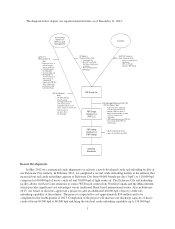PBF Energy 2012 Annual Report Download - page 21
Download and view the complete annual report
Please find page 21 of the 2012 PBF Energy annual report below. You can navigate through the pages in the report by either clicking on the pages listed below, or by using the keyword search tool below to find specific information within the annual report.specialty petroleum products; Cortez Pipeline Company, a 500 mile CO2 pipeline; and Venture Coke Company,
a merchant petroleum coke calciner. Before joining M.E. Zukerman & Co., Mr. Lucey spent six years in the
banking industry.
Jeffrey Dill has served as our Senior Vice President, General Counsel and Secretary since May 2010 and
from March 2008 until September 2009. Mr. Dill served as Senior Vice President, General Counsel and Secretary
for Maxum Petroleum, Inc., a national marketer and logistics company for petroleum products, from September
2009 to May 2010 and as Consulting General Counsel and Secretary for NTR Acquisition Co., a special purpose
acquisition company focused on downstream energy opportunities, from April 2007 to February 2008. Previously
he served as Vice President, General Counsel and Secretary at Neurogen Corporation, a drug discovery and
development company, from March 2006 to December 2007. Mr. Dill has over 15 years experience providing
legal support to refining, transportation and marketing organizations in the petroleum industry, including
positions at Premcor, ConocoPhillips, Tosco and Unocal.
Environmental, Health and Safety Matters
Refinery and pipeline operations are subject to federal, state and local laws regulating the discharge of
matter into the environment or otherwise relating to human health and safety or the protection of the
environment. These laws regulate, among other things, the generation, storage, handling, use and transportation
of petroleum and other regulated materials, the emission and discharge of materials into the environment, waste
management, remediation of contaminated sites, characteristics and composition of gasoline and distillates and
other matters otherwise relating to the protection of the environment. Permits are also required under these laws
for the operation of our refineries, pipelines and related operations and these permits are subject to revocation,
modification and renewal. Compliance with applicable environmental laws, regulations and permits will continue
to have an impact on our operations, results of operations and capital requirements. We believe that our current
operations are in substantial compliance with existing environmental laws, regulations and permits.
Our operations and many of the products we manufacture are subject to certain specific requirements of the
CAA, and related state and local regulations. The CAA contains provisions that require capital expenditures for
the installation of certain air pollution control devices at our refineries. Subsequent rule making authorized by the
CAA or similar laws or new agency interpretations of existing rules, may necessitate additional expenditures in
future years.
Additionally, as of January 1, 2011 we are required to meet an EPA regulation limiting the average sulfur
content in gasoline to 30 PPM. The EPA has also announced that it plans to propose new “Tier 3” motor vehicle
emission and fuel standards. It has been reported that these new Tier 3 regulations may, among other things,
lower the maximum average sulfur content of gasoline from 30 PPM to 10 PPM. If the Tier 3 regulations are
eventually implemented and lower the maximum allowable content of sulfur or other constituents in fuels that we
produce, we may at some point in the future be required to make significant capital expenditures and/or incur
materially increased operating costs to comply with the new standards. As of January 1, 2011, we are required to
comply with the EPA’s Control of Hazardous Air Pollutants From Mobile Sources, or MSAT2, regulations on
gasoline that impose reductions in the benzene content of our produced gasoline. We purchase benzene credits to
meet these requirements. Our planned capital projects will reduce the amount of benzene credits that we need to
purchase. In addition, the renewable fuel standards mandate the blending of prescribed percentages of renewable
fuels (e.g., ethanol and biofuels) into our produced gasoline and diesel. These new requirements, other
requirements of the CAA and other presently existing or future environmental regulations may cause us to make
substantial capital expenditures as well as the purchase of credits at significant cost, to enable our refineries to
produce products that meet applicable requirements.
Our operations are also subject to the federal Clean Water Act, or the CWA, the federal Safe Drinking
Water Act, or the SDWA, and comparable state and local requirements. The CWA, the SDWA and analogous
laws prohibit any discharge into surface waters, ground waters, injection wells and publicly-owned treatment
13
























